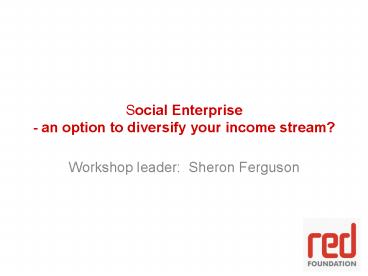Social Enterprise an option to diversify your income stream - PowerPoint PPT Presentation
1 / 21
Title:
Social Enterprise an option to diversify your income stream
Description:
What is a Social Enterprise? ... Employee-owned businesses. Community businesses. Credit Unions. Co-operatives. Development Trusts ... – PowerPoint PPT presentation
Number of Views:30
Avg rating:3.0/5.0
Title: Social Enterprise an option to diversify your income stream
1
Social Enterprise- an option to diversify your
income stream?
- Workshop leader Sheron Ferguson
2
Overview of workshop
- Definition of Social Enterprise
- Key characteristics of Social Enterprise
- Types of Social Enterprise
- Income Categories
- Benefits and Difficulties of Social Enterprise
- Social Enterprise Development
- Useful sources of information and networks
3
What is a Social Enterprise?
A social enterprise is a business with
primarily social objectives whose surpluses are
principally reinvested for that purpose in the
business or in the community, rather than being
driven by the need to maximise profit for
shareholders and owners. Office of the Third
Sector
4
What is a Social Enterprise?
Social Enterprises stand out from the rest of
the social economy as organisations that use
trading activities to achieve their goals and
financial self-sufficiency. Social Enterprise
London
5
What is a Social Enterprise?
A social enterprise is not defined by its
legal status, but by its nature its social aims
and outcomes, the basis on which its social
mission is embedded in its structure and
governance, and the way it uses the profits it
generates through its trading activities. The
Social Enterprise Coalition
6
Social Enterprise key characteristics
- trading
- social aims
- independence of the organisation
- participation of its stakeholders
- reinvestment of profits back into meeting
- its social aims
7
Exercise 1 Which of the following organisations
are Social Enterprises?
8
Types of Social Enterprise
- Employee-owned businesses
- Community businesses
- Credit Unions
- Co-operatives
- Development Trusts
- Social Firms
- Social Businesses
- Intermediate Labour Market Companies
9
Social Enterprise as an option
- Why charities might HAVE TO consider social
enterprise activities - Much of the statutory grant sector is becoming
contract-driven as Government more and more
outsources public services to the Third Sector - Pressures on the Third Sector are seeing more
and more charities looking seriously at
supplementing grant funding and donations with
earned income
10
Income Categories
Healthy organisations need to develop a
broad-based income
11
Individual Exercise
Income Categories What is the breakdown in
terms of income for your organisation in the
categories
12
Exercise 2 What do you think are the
potential
a) benefits of an existing charity engaging in
Social Enterprise activity? b) difficulties of
an existing charity engaging in Social Enterprise
activity?
13
Exercise 3
In what ways do you think these potential
difficulties can be addressed?
14
Social Enterprise Development
- Clarify idea and get people on board create a
team - Innovate develop your seed idea with
stakeholders - and research your market
- Assess feasibility market, resources,
cost-v-income, - risk and funding
- Be realistic if it doesnt look feasible
dont pursue it! - Develop the business plan and funding strategy
- Pilot and evaluate
- Alls well? launch
- Evaluate and celebrate success!
- Continue to monitor and evaluate and adjust as
needed
15
Social Enterprise Development
One of the first things to be aware of when
thinking about setting up a social enterprise, is
that a social enterprise is not a legal entity in
itself. It is defined by what it does and how it
does it. However, in order to carry out any
trading activity, it must have some sort of legal
structure or identity.
16
The main options for legal status available to
a Social Enterprise are
17
Charities and Social Enterprise
- Charities Commission Publication CC35 - Trustees,
trading and tax - How charities may lawfully
trade - It is important to be aware of Charities
Commission restrictions on trading and the
benefits - Trading must be allowed within governing document
- Charities may not engage in trading which risks
assets - Primary purpose trading benefits from tax
benefits including exemption from corporation
tax, discretionary business rate relief and gift
aid from trading subsidiaries
18
Useful sources of information and networks for
Social Enterprises
- NCVO - The Sustainable Funding Project encourages
and enables voluntary and community organisations
to explore and exploit a full range of funding
and financing options to develop a sustainable
funding mix - www.ncvo-vol.org.uk/sfp/
- The Finance Hub - making sense of finance and
funding in the Third Sector www.financehub.org.uk - Social Enterprise Coalition www.socialenterprise.o
rg.uk
19
Useful sources of information and networks for
Social Enterprises
- Social Enterprise London www.sel.org.uk
- Office of the Third Sector Social Enterprise
Action Plan http//www.cabinetoffice.gov.uk/third_
sector/social_enterprise/action_plan/ - Charities Commission publication Trustees,
trading and tax How charities may lawfully trade
- http//www.charity-commission.gov.uk/publications/
cc35.asp
20
Useful sources of information and networks for
Social Enterprises
- Sources of finance
- Esmee Fairbairn Foundation www.esmeefairbairn.org.
uk/ - Futurebuilders www.futurebuilders-england.org.uk
- Adventure Capital Fund www.adventurecapitalfund.or
g.uk - Charity Bank www.charitybank.org
- Community Development Finance Institutions
http//cdfi.org
21
Reference should be made toCharities
CommissionProfessional advisors (where
appropriate)The Red Foundation makes every
effort to ensure that information contained in
this presentation is up-to-date and accurate at
the time of being printed. However, legislation
is continually changing and all delegates are
encouraged to use the many published sources to
keep themselves abreast of new developments and
trends. These notes are not designed as a
stand-alone document but are intended to
accompany a facilitated programme of
training/workshop.































